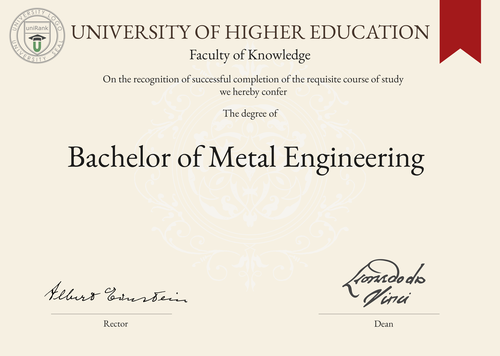
Bachelor of Metal Engineering (BME)
Guide to University Programs/Courses
Bachelor of Metal Engineering (BME)

Program/Course Name
Bachelor of Metal EngineeringProgram/Course Abbreviation
BMEDuration Range
The duration of the Bachelor of Metal Engineering program typically ranges from 3 to 4 years.Tuition range
The tuition fees for the Bachelor of Metal Engineering program can vary depending on the country and university chosen. It is recommended to check with specific institutions for accurate information.Overview
The Bachelor of Metal Engineering program is designed to provide students with a comprehensive understanding of the principles and practices involved in the field of metal engineering. It covers various aspects such as metallurgy, materials science, manufacturing processes and quality control.Curriculum Overview by Year
- Year 1: Introduction to Metal Engineering, Mathematics for Engineers, Physics, Materials Science- Year 2: Metallurgical Thermodynamics, Mechanical Behavior of Materials, Metal Forming Processes, Heat Treatment- Year 3: Welding and Joining Processes, Metal Casting, Metal Machining, Failure Analysis- Year 4: Advanced Metal Engineering, Industrial Management, Research ProjectKey Components
The key components of the Bachelor of Metal Engineering program include theoretical knowledge, practical skills, laboratory work, industrial visits and research projects. Students will gain expertise in areas such as metallurgical analysis, metal forming, welding and quality control.Career Prospects
Graduates of the Bachelor of Metal Engineering program can pursue various career paths in industries such as automotive, aerospace, manufacturing, construction and mining. They can work as metallurgical engineers, materials engineers, quality control engineers, production managers, or research and development specialists.Salary Expectations
The salary expectations for graduates of the Bachelor of Metal Engineering program can vary depending on factors such as the country, industry, job role and level of experience. On average, metal engineers can earn a competitive salary with opportunities for growth and advancement. For a more accurate understanding of salary expectations, you can utilize the Job Sites Search Engine, from our sister site jobRank, which searches over 4,600 job sites worldwide. Make sure to specify not only the job title but also the country you are interested in.Conclusions
It is important to note that the duration, tuition fees, curriculum, key components, career prospects and salary expectations of the Bachelor of Metal Engineering program can vary based on the chosen country or location for studying the program, as well as the chosen university. Prospective students are advised to research and compare different universities and countries to find the best fit for their educational and career goals. Visitors can search for where this specific degree, Bachelor of Metal Engineering, is offered anywhere in the world through the uniRank World Universities Search Engine.World Universities Search Engine
search for Bachelor of Metal Engineering (BME) and add the Location (country, state etc.) or specific University you are interested in studying at.
Query examples:
- Bachelor of Metal Engineering (BME) United States
- Bachelor of Metal Engineering (BME) United Kingdom online
- Bachelor of Metal Engineering (BME) Australia international students
- Bachelor of Metal Engineering (BME) University of California
- Bachelor of Metal Engineering (BME) University of London tuition fees
- Bachelor of Metal Engineering (BME) University of Sydney scholarships